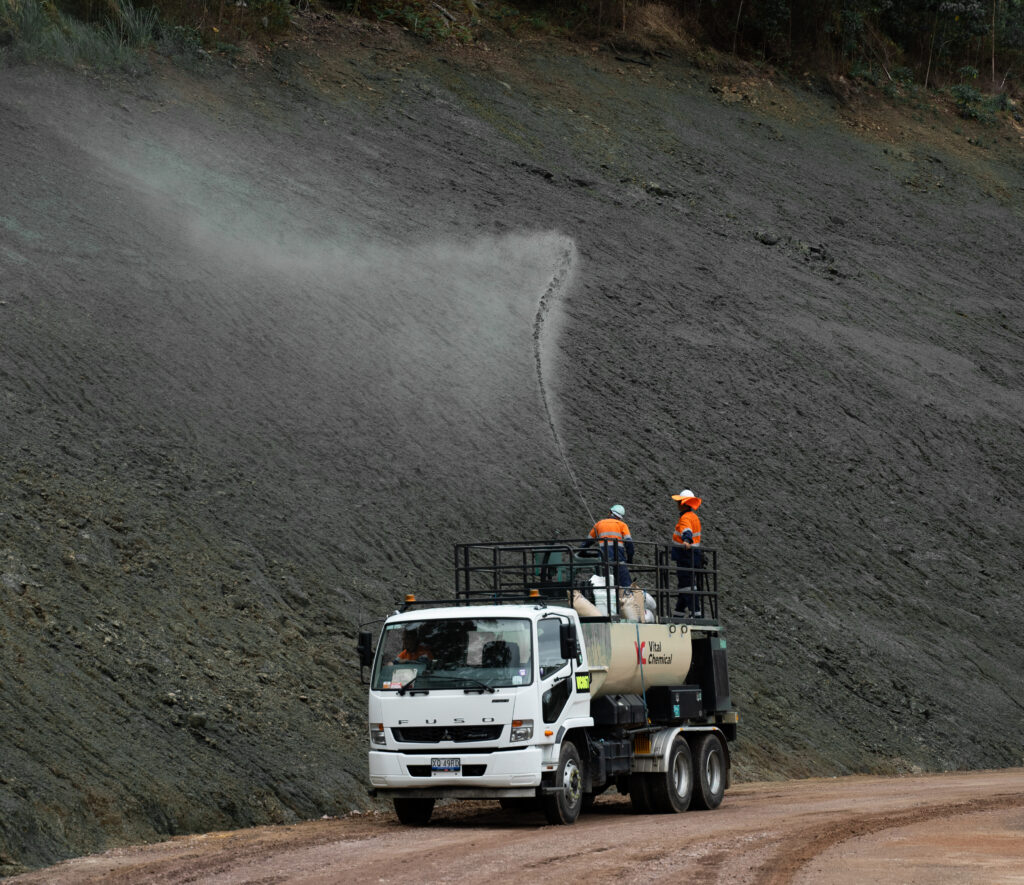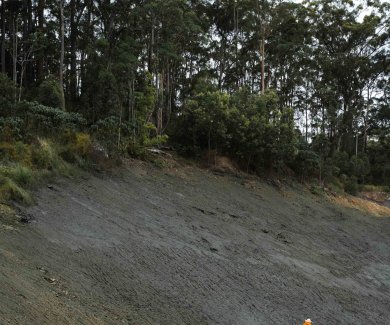In Australia we are seeing a growing trend towards incorporating renewables into civil construction projects, indicating an industry-wide commitment to reducing the amount of virgin materials being used.
One such renewable is Biochar, a carbon-rich product that is being proven to provide a range of environmentally sustainable benefits on construction sites.
In this blog we explain what Biochar is and how it is made, its advantages as a revegetation solution and the important role it plays in the future of construction projects.
What is Biochar?
Biochar is produced from pyrolisation of biomass under controlled processes to produce a sustainable and renewable source of high-quality contaminant-free organic carbon.
Research documented in The Intergovernmental Panel on Climate Change’s Special Report on Climate Change and Land provides evidence that Biochar could be seen to alleviate between an estimated 300 to 600 million tonnes of carbon dioxide globally each year by 2050. In 2020, Australia produced estimated emissions of 499 million tonnes.
As part of our country’s commitment to reach net zero carbon emissions by 2050, renewables like Biochar are leading the way to circularity and the restoration of organic carbon back into our ecosystems.
Vital Chemical Director and Scientist Letiscia Xavier says it is imperative for the construction industry to start turning towards and focusing on renewable solutions and outcomes.
“Civil and construction is currently one of the most resource-heavy sectors. By researching, developing and providing renewable alternatives to reduce the current use of virgin materials, we will be able to shift this sector to achieving more environmentally sustainable outcomes. Biochar achieves a full circular economy, taking carbon from vegetation and then putting it back into the soil to aid revegetation. By adopting the process to sustainably take it, recover it, reprocess it, use it and reestablish it back into the environment, Biochar helps us to replace and replenish the carbon in our soils.”
Cluster industry group, Australia New Zealand Biochar Industry Group (ANZBIG) has emerged as the leading association for abdicating for the effective production and use of Biochar.
With a key focus on supporting education, research, collaboration and commercialisation activities within the wider Biochar community, ANZBIG plays a synergistic role in nurturing and supporting innovation and growth.
As a foundation member, ANZBIG provides Vital Chemical with a unique platform to educate and collaborate with other key Biochar experts. By showcasing our own research and initiatives, we are able to play an integral part in educating the wider construction industry on Biochar and its many benefits.
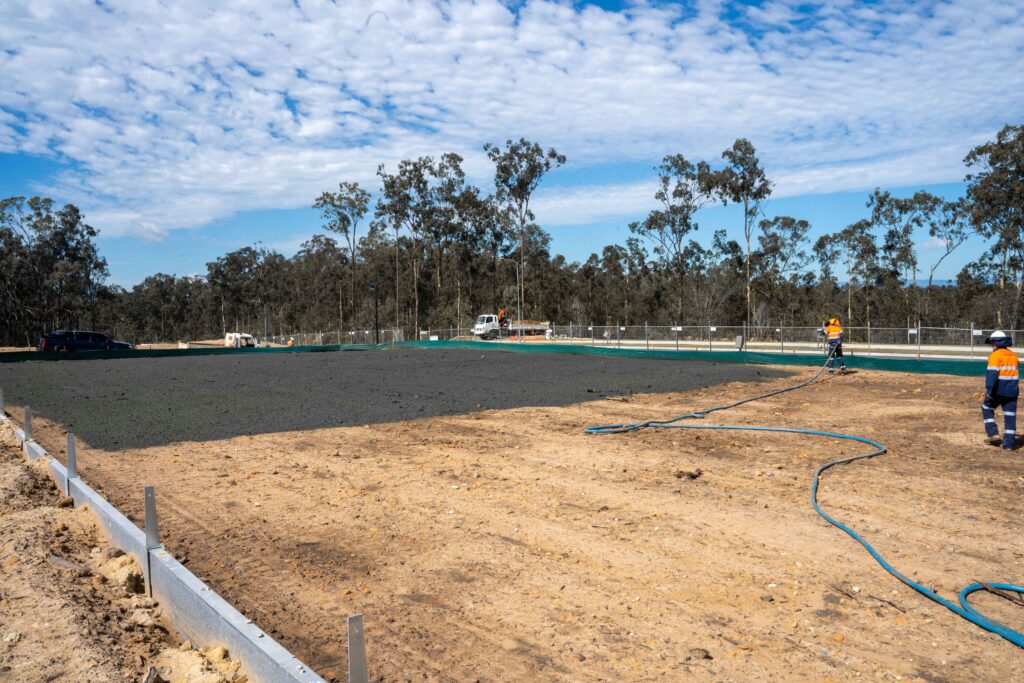
Biochar achieves a full circular economy, taking carbon from vegetation and then putting it back into the soil to aid revegetation.
Advantages of Biochar
The advantages and versatility of Biochar are numerous and well documented, including:
- Improved soil quality and retention of nutrients
- Beneficial water retention
- Reduction of synthetic fertilisers
- Reduction of costs
Improved soil quality and retention of nutrients
Soil is a living ecosystem, with the protection and growth of its microbiome essential in order to sustain its nutrient cycle. The inclusion of Biochar into soils dramatically improves and increases soil organics, improving plant health and viability. Biochar binds and sequests essential nutrients, preventing their ability to leach out into the soils, increasing their bio-availability.
Beneficial water retention
The porosity of Biochar provides soils with increased moisture retention, reducing watering requirements. The resulting moisture-rich biosystem of nutrients, bacteria and fungi also can provide water storage during dryer periods, and can also assist soils with drainage capabilities.
Reduction of synthetic fertilisers
Biochar has been proven to effectively reduce the requirement for synthetic-based fertilisers through the provision of its organic fertiliser properties. Hence, with Biochar’s ability to reduce the soils requirements for metals, reduces soil acidity whilst improving the retention and accessibility of nutrients, the need to supplement with synthetic fertilisers is greatly reduced.
Reduction of costs
Through increased water retention and improved nutrient qualities, Biochar increases the efficiency of soils and reduces the requirement for maintenance. Expenses including water, fertilisers and additional organic-boosting properties should be negated with an additional benefit of carbon sequestration in the soil, helping to contribute to mitigating climate change.
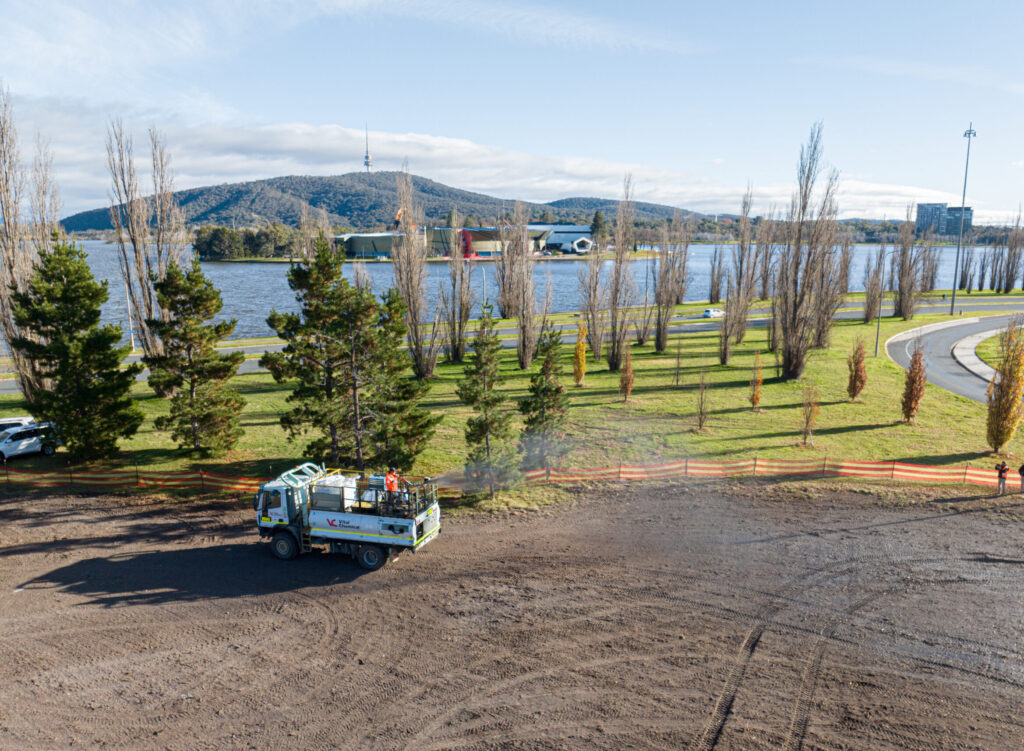
The porosity of Biochar provides soils with increased moisture retention, reducing watering requirements.
Using Biochar in Civil and Construction Projects
The versatility of Biochar makes it an ideal environmentally sustainable solution for a range of sectors including concrete, roads and other civil construction and infrastructure projects and also water treatment.
The Infrastructure for Climate Action Report, collaboratively developed by UNOPS, UNEP and the University of Oxford, states that “…infrastructure is responsible for 79% of all greenhouse gas emissions as well as 88% of all adaption costs and therefore this sector is centrally important to achieving the Paris Agreement and the Sustainable development goals.”
On civil construction sites, the addition of Biochar to revegetation solutions provides a sustainably superior and long-lasting solution to deliver improved soil and plant growth throughout the lifecycle of the project.
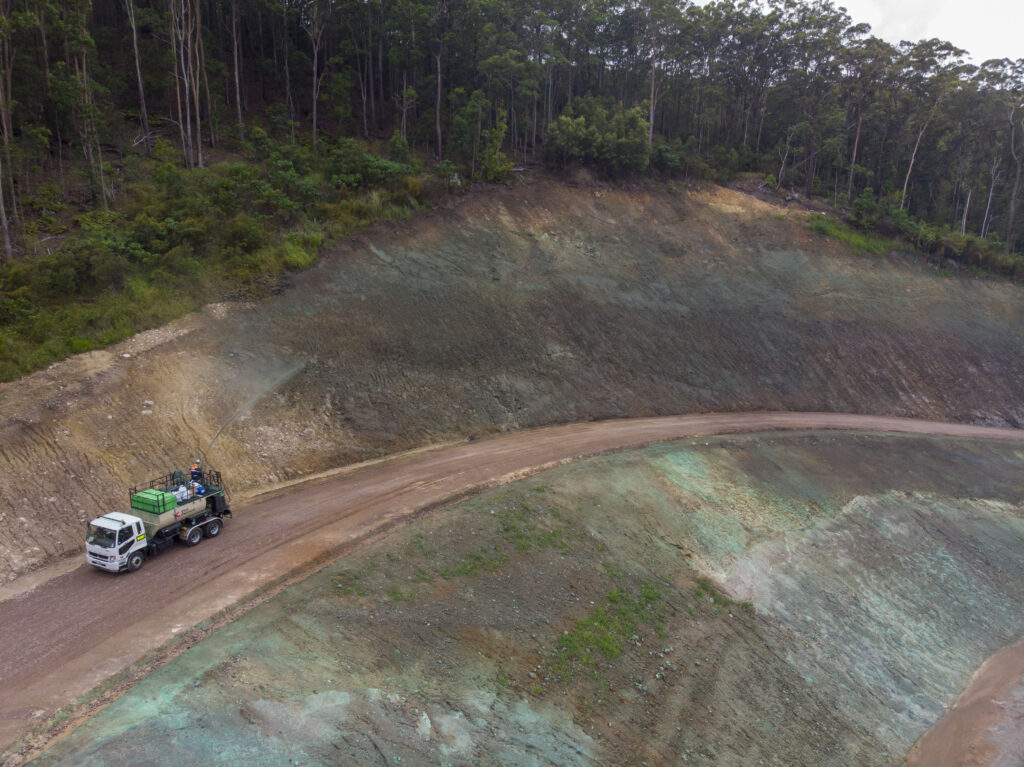
On civil construction sites, the addition of Biochar to revegetation solutions delivers improved soil and plant growth throughout the lifecycle of the project.
Vital Biochar – your award-winning revegetation solution
At Vital Chemical, we are committed to sustainability through environmental stewardship, social responsibility, cultural connection, and delivering economic benefits.
Vital Biochar is a sustainable and renewable source of high-quality contaminant-free organic carbon.
Sustainably sourced and produced in Australia from thermally treated organic forest residues and waste timbers, Vital Biochar meets the growing demand for reliable, at scale supply of Biochar for revegetation, amelioration and return of carbon back to carbon depleted soils.
Revegetation and amelioration
Soils disturbed through mining or construction activities have low or no organic carbon content. Vital Biochar’s versatility allows for it to be topically applied, prior to or as part of the revegetation process to support improved seed establishment and long-term soil regeneration.
Water treatment
Within the civil infrastructure sector, the use of Vital Biochar supports improved water quality as part of an integrated water treatment system. Vital Biochar can be highly effective in removing a range of contaminants, providing improved water treatment outcomes.
Contamination isolation and remediation
Vital Biochar can be used to initially immobilise and support soil remediation, acting as a sustainable alternative to coal-based PAC and GAG.
2024 ANZBIG Winner
We were thrilled to accept the ANZBIG Biochar User Award (Soil Category) at this year’s National Biochar Awards.
We are proud to be recognised for our innovative and proven use of Vital Biochar as an industry-leading revegetation solution.
This year, the awards were held in Perth as the closing event of the ANZBIG WA Forum and celebrated the achievements, innovation and entrepreneurship in the ANZ Biochar Industry.
Vital Chemical’s Director, Paul McMullen accepted the award together with James Nebauer, General Manager at B & K Revegetation & Landscaping, our key industry partner.
Paul enjoyed the opportunity to recognise industry excellence within the greater Biochar community, commenting:
“It was an absolute honour to win this award and be recognised amongst other forward-thinking environmental experts. At Vital Chemical our core business focus is to create a more circular and sustainable product portfolio, like Vital Biochar. We are privileged to be able to share these environmentally sustainable solutions and help the civil and construction industry to reduce its environmental footprint.”
Congratulations to all this year’s winners and thank you to ANZBIG, and the award sponsors, for a great night.

(L – R) Vital Chemical’s Director, Paul McMullen and B & K Revegetation & Landscaping’s General Manager, James Nabauer accepting the award.
Our team of technical experts is ready and waiting to answer your queries regarding Vital Biochar and help you to include it as part of your next revegetation solution. Talk to us today to learn more.
